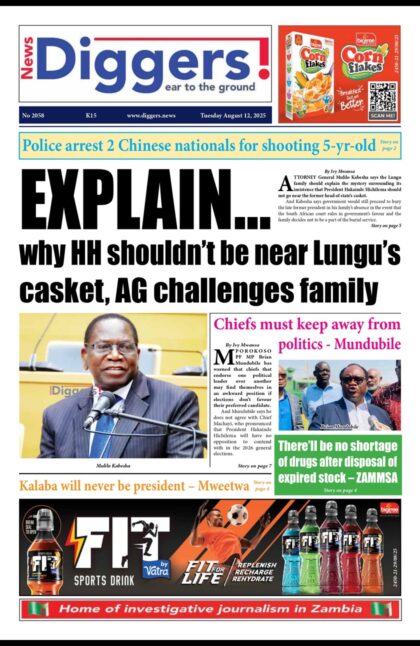ONE of the most important roles of a newspaper is to inform the public about matters that affect them. The media plays a critical role in safeguarding public interests by simply informing the public. A newspaper does not create the news, it simply reports the news. One of our sacred duties as journalists is to follow the news wherever it leads us and report it.
This is why you have journalists reporting from warzones and endangering their own lives for the sake of news. Such journalists are respecting the duty to keep the public informed. Even in dangerous times of infectious diseases such as Covid-19 or even Ebola, you still have journalists gathering news so that the public can be well informed about what is going on.
Corruption and abuse of public resources is one of the biggest problems that face us as a nation. It is such an important subject matter for Zambia and Zambians; and we have no choice but to follow the news about allegations of corruption with keen interest. We don’t do this for ourselves or because we hate someone or because we are hired to expose someone; no, we do this because we have a duty to inform the public.
But we have no illusions about the consequences of our work. We fully understand how dangerous fighting corruption can be. It is now a common saying that when you fight corruption of any shape or form, expect corruption and the corrupt to fight you back. We are therefore not surprised when we see a company that has failed to convincingly explain how it came about and how it won a US$17 million dollar government contract can resort to openly threatening us.
When we started reporting on what we saw to be irregularities around the Honeybee transaction, we were a lone voice. Some people who commented on it were threatened and induced to retract their comments, which they did. We never gave up, we continued to dig even when the public seemed disinterested and fatigued with our persistence. What kept us going is the fact that there is always an audience that is interested in matters of accountability.
We have now reached a point where that audience has grown. Anyone who is truly interested can explain what is wrong with this transaction, not only because the tender was irregularly awarded, but because Honeybee ended up supplying damaged drugs and condoms. When you talk about Honeybee and the US$17 million, it is not difficult to conclude that there is either corruption or outright abuse of authority by those involved in this transaction.
Honeybee doesn’t agree with us and we have challenged them to take us to court. We have been waiting for their court actions so that we can take them on, but instead of moving with speed on their legal action, they are looking for shortcuts to shutting us up. Instead of explaining the many glaring irregularities in their Ministry of Health tender, Honeybee wishes to silence us using state institutions like NAPSA. What happened to the court action?
We wonder where Honeybee is getting all this courage because after all that has been exposed, you would expect Honeybee to be hiding in a hole somewhere with their tails between their legs. But hell no! They have the guts to threaten us. After abusing taxpayers’ money, Honeybee wants to use the same tax payers’ institutions to silence us. How ironic!
We have told Honeybee to take us to court if they feel we published lies about them. If they don’t want that, they must then deal with their own demons and the rotten transaction that they got from the Ministry of Health. Trying to intimidate us will not help them. Even closing us will not help them. It’s an action that has been tried before and the results are there for all to see. How many media institutions have been closed in Zambia under this regime?
We can assure Honeybee and all their allies that even if they succeed in closing us, others will come, just like we did, and they will continue to expose the rot that is going on in this country. Journalism is an idea in someone’s head, it’s not a building or an institution. It is a mission. It is time people realised that there are just too many missionaries. They can’t finish us all. Instead of trying to finish journalists, they should just do the right thing and make our anti-corruption reporting irrelevant.
But for as long as they continue to do wrong things, there will always be a journalist to expose them. The problem is not the media house or the journalist, it is the abuse of power and public resources. That is the problem. We are only a reflection of the society you have created for yourselves.
























